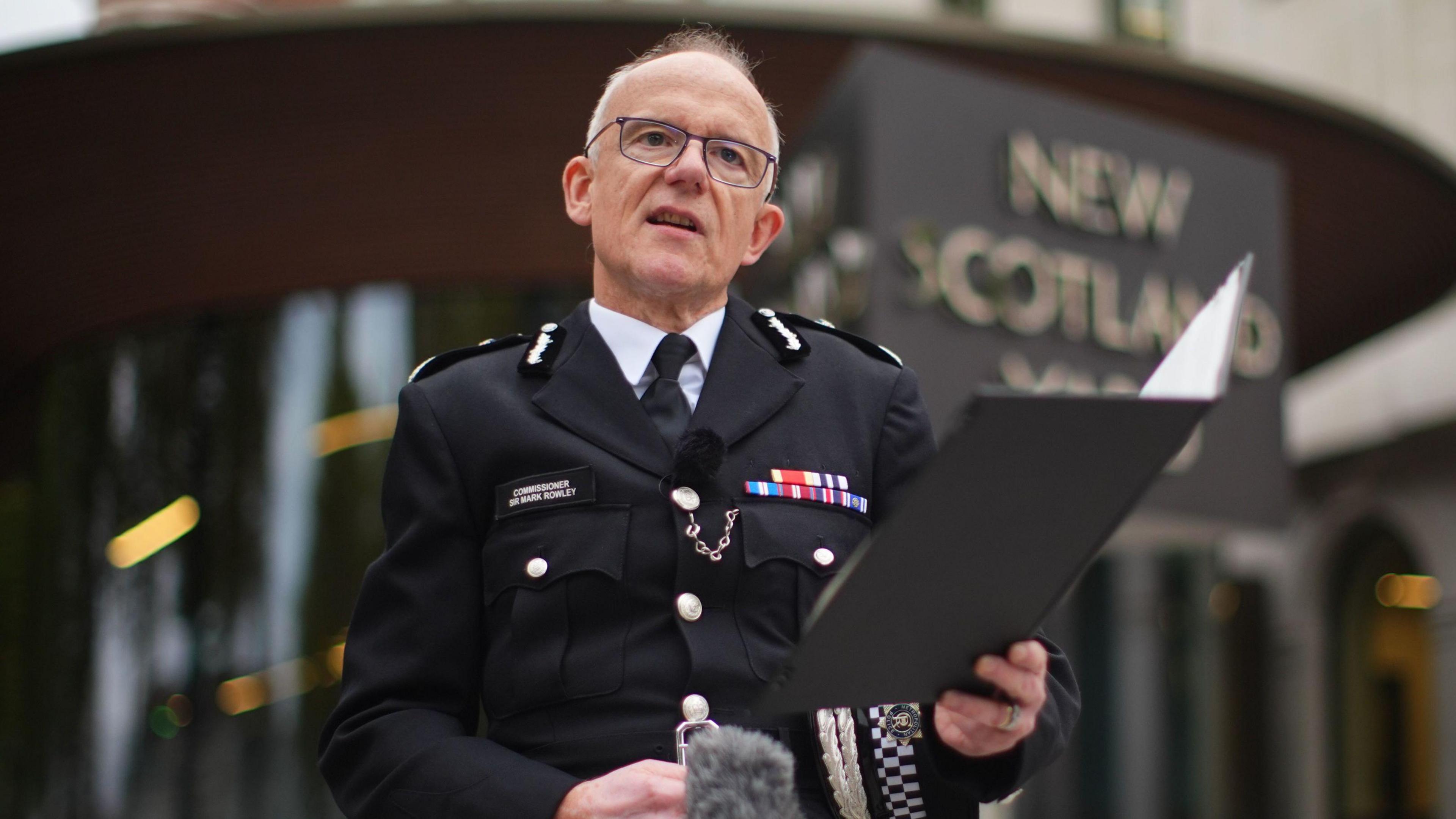Met wants 'sub-standard' senior officers to leave

Sir Mark Rowley said Met performance reviews were 'less than candid'
- Published
The head of the Metropolitan Police has said he plans to get rid of senior officers who are judged not to have met performance standards or upheld the force's values.
Sir Mark Rowley wrote to officers between the ranks of chief inspector and chief superintendent earlier this week, saying he wanted to provide an "exit route" for senior staff through voluntary pay-offs.
It comes as the Met commissioner seeks to reform a force dogged with accusations of institutional racism, misogyny and homophobia, as well as instances of wrongdoing, all while closing a gap in funding.
But the Met Police Federation, which represents officers up to chief inspector rank, called Sir Mark's proposals "a thinly veiled threat".
'Healthier churn'
The voluntary exit scheme is part of a three-pronged approach to ensure a "fundamental shift in mindset, behaviour and capability" needed among senior police, said the letter, which was also signed by Deputy Commissioner Matt Jukes.
In the letter, Sir Mark told senior officers: "We will also be more direct in identifying and tackling those of you who are unwilling or unable to meet our performance standards or role model our values.
"Our mission is too important to excuse those who continue to coast, or worst still underperform."
The letter said the Met is also in talks with the Home Office to reinstate powers requiring compulsory retirement "on grounds of efficiency" to support a "healthier churn" and create "opportunities for talent".
More precise end-of-year performance reviews were announced, as well as development centres to assess police leaders' capabilities.
Sir Mark said performance reviews in the force were previously "less than candid".
He added: "I am acutely aware that confidence is not necessarily a measure of competence, some unjustifiably lack confidence yet others have more confidence than their ability justifies."
Which roles are being targeted?
A chief inspector's duties include managing staff performance and budgets, as well as taking command of major incidents.
Chief superintendent is a more senior police rank responsible for leading large, complex areas of command, often managing multiple departments or a specific geographical area.
Both sit above police constables, sergeants and inspectors, and below the rank of commander.
Anti-black discrimination systemic in Met - report
- Published7 November
Met chief vows 'ruthless' rogue officer clear-out
- Published16 October
Matt Cane, general secretary of the Metropolitan Police Federation said the overwhelming majority of its members at chief inspector rank "give everything they have, often at considerable personal cost, to meet the growing and complex demands placed upon them".
He added: "They deserve support and respect, not threats of 'forced distribution', 'performance processes', or 'dignified exits'.
"The proposed voluntary exit scheme, framed as a 'quick and dignified route out', is a thinly veiled threat."
'Al Capone approach'
Mr Cane said he plans to write to Sir Mark about his concerns.
A Met police spokesperson said the commissioner "has been clear the minority who resist change have no place in the Met".
Last month, the Met confirmed it had removed more than 1,400 officers and staff from its ranks in three years in what Deputy Commissioner Jukes called an "Al Capone" approach to uncover wrongdoing.
The clear out, sparked in the wake of the murder of Sarah Everard by a serving Met officer, is the largest in the force's history.
Figures show that 1,442 staff and officers were sacked, resigned or retired between 2022 and June 2025.
Panorama: Undercover in the Police
Secret filming by Panorama reveals evidence of racism, misogyny and officers revelling in the use of force at one of London’s busiest police stations, Charing Cross.
Watch now on iPlayer
On Friday, an independent report commissioned by the Met concluded that the force had a problem with "systematic racism".
The review looked at the force's systems, leadership, governance and culture, and concluded racial harm was "maintained through a repeated institutional sequence" within the force.
It comes after Louise Casey's 2023 report - commissioned following the murder of Sarah Everard - concluded that the Met was institutionally racist, misogynistic and homophobic.
Reviews conducted decades ago have criticised discrimination within the Met - including the 1999 Macpherson report, which called the force "institutionally racist" after the mishandling of Stephen Lawrence's case.
Last month, a BBC investigation exposed misconduct at Charing Cross station, which has since led to six officers being sacked.
Sir Mark pledged he would be "ruthless" in getting rid of officers deemed unfit to serve
The Met partially reversed plans to close front desks at police stations across London in October following a backlash, but vowed to make "tough choices" to close a £260m funding shortfall.
Listen to the best of BBC Radio London on Sounds and follow BBC London on Facebook, external, X, external and Instagram, external. Send your story ideas to hello.bbclondon@bbc.co.uk, external